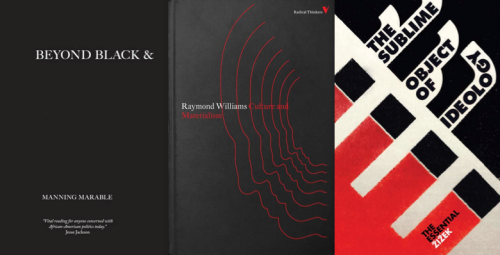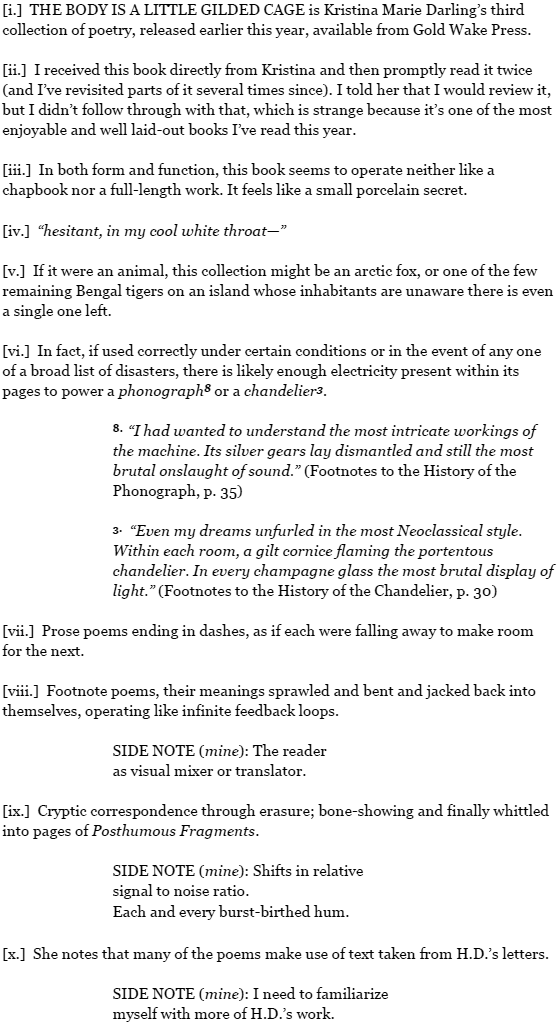25 Points: Dear Editor
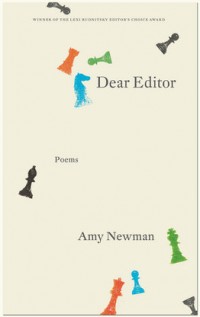 Dear Editor
Dear Editor
by Amy Newman
Persea Books, 2011
80 pages / $15.00 buy from Powell’s
1. Dear Editor contains cover letters from Amy Newman to an unnamed editor or editors, spread across three seasons. Most of the letters follow the typical format of writer correspondence, beginning with the word “please.”
2. Writers are expected to treat editors with professional respect, particularly if that magazines ends with the word Review.
3. The pejorative connotations of the word “submission” have been investigated elsewhere, but Newman revises the process. Submission is a form of prayer. Waiting occurs.
4. Writers need editors. Editors need writers. Some people are both.
5. The manuscript being submitted is titled X = Pawn Capture.
6. Newman does not include any direct poems from this hypothetical collection, and for good reason: the project is contextualized, not concrete. The collection appears to be “a lyrical study of chess,” or not.
7. Saints appear throughout Dear Editor.
8. Saints are abnormal. Such is their beauty.
9. Some saints who appear in this book: Saint Berry (not real), Saint Lucy (real, but the letter writer’s grandmother claimed that, on her wedding day, “Lucy came in and winked behind the altar, stuck out her tongue”). St. Brigid of Ireland. “Isn’t faith a kind of belief that is never satisfied?” Euphrosyne.
10. Is the letter writer Amy Newman? Amy Newman signs the letters. Her name is on the front of the book. READ MORE >
December 11th, 2012 / 12:09 pm
25 Points: Variations on the Sun
 Variations on the Sun
Variations on the Sun
by M Kitchell
Love Symbol Press, 2012
88 pages / $12 (print) $1 (digital) buy from Love Symbol Press
1. I think I bought the last physical copy of this book, but you can still buy it in pdf form. Hopefully there will be another print run or something cool happens in a second edition.
2. When I opened the envelope I thought the book was damaged because it had what looked like worn out areas on all the areas that a book normally gets worn out areas. I was kind of pissed. Those are actually just part of the design. I am really excited about that now. It reminds me of Scorch Atlas, though much more subtle, crisp, and clean.
3. The cover design reminds me of these books by Verso:
4. I don’t think any description of the book I read in advance of reading the book, does the book any justice. This kind of writing:
“
i can’t help but feel totally fucking outside of myself when i try to come to terms with my position as a body a human body in the midst of whatever-the-fuck-it-is that i’m trying to do
“
– THE SALT VOICES
is next to this kind of writing:
“
There are no faces on the bodies, no arms, no legs, no genitalia, no hair, no eyes, no fingernails, no fingers, no hands, no toes, no feet, no ears, no nose, no mouth, no eyebrows, no eyelashes, no eyes, no chest, no armpits, no nipples, no bellybutton, no ass-hole, no ass, no crotch, no torso, no hips, there are no bodies.
“
– THE NEGATION OF BODIES
There are lots of other tones and styles inside the book as well. There are also photographs. Everything looks really nice.
5. This is the first book from Love Symbol Press. If they keep this up, they will be my favorite press.
6. At times Variations on the Sun reads like a textbook on architecture. There is also a lot of violence, but sometimes it’s very cute. And other times it’s very stark. At other times still, very baroque. I have a hard time finding other poetries that compare to this one.
7. Last time I talked to Evan Lavender-Smith, he used the term New Brutalism to describe the style of Blake Butler, Christopher Higgs, M Kitchell, Ken Baumann, etc. I find the term pretty accurate when compared to Brutalism, the architectural movement born out of post-WWII Europe. At first I thought he was just riffing, talking about Blake’s review of Leaving the Atocha Station, but it made sense: New Brutalism, a literature born during the Global War on Terror.
8. I don’t really know anything about architecture, outside of wikipedia and some art history classes as an undergrad, but I find the way Brutalist structures are described by Prince Charles to be pretty amusing: “You have to give this much to the Luftwaffe, at least when it knocked down our buildings they didn’t replace them with anything more offensive than rubble.”
9. Other than things online, I haven’t read anything by M Kitchell before.
10. Looking at works of New Brutalism would be a good way to enter the book, but so would the works of New Sincerity, especially the poetry of Tao Lin. READ MORE >
December 6th, 2012 / 9:09 am
25 Points: So Say the Waiters
 So Say The Waiters/book1/episodes 1-5
So Say The Waiters/book1/episodes 1-5
by Justin Sirois
Severed Books, 2012
293 pages / $13.99 (print) $6.99 (eBook) buy from sosaythewaiters.com or Amazon
1. This book reminds me also of the 90s Michael Douglas movie The Game in which a rich guy’s brother signs him up for a role play service which makes his life more interesting via nearly killing him such as in multiple car chase scenes as well as I think he rolls down a mountain wearing a suit at one point.
2. Justin Sirois has written a book about nicely done realistic people who are bartenders and in bands but this book is not annoying about that at all because it’s elegantly self-aware and spot on like every two seconds you let out an out loud Ha because yes everyone is exactly like how he depicts them but kinda lovingly actually I feel like he should write some epic movie about indie culture.
3. So the people in this book are called Waiters in a way because they are I think waiting for their lives to get going already but it’s not cheesy it’s good.
4. What it is is that they sign up for a service that kidnaps them and it’s got that “now you will appreciate your life more” thing going on but also it’s kinda Fight Club-ish but more cyberpunk.
5. “Cyberpunk is a postmodern science fiction genre noted for its focus on “high tech and low life.” The name was originally coined by Bruce Bethke as the title of his short story “Cyberpunk,” published in 1983. It features advanced science, such as information technology and cybernetics, coupled with a degree of breakdown or radical change in the social order.” “”Classic cyberpunk characters were marginalized, alienated loners who lived on the edge of society in generally dystopic futures where daily life was impacted by rapid technological change, an ubiquitous datasphere of computerized information, and invasive modification of the human body.” – Lawrence Person” -this is according to Wikipedia.
6. I cannot believe these Wikipedia bastards forgot to talk about William Gibson here. Did you ever read any William Gibson in middle school and then go home and wait five and a half hours for a Nine Inch Nails song to download through your parents dial-up modem in the basement at all?
7. That girl from the Dragon Tattoo books movies looks like she could be cyberpunk. What do you think she smells like?
8. Also Henry the main guy in Sirois’ book has just been dumped by his fiancee and every time he thinks about her it’s so effing sad and done well.
9. “At the cabinet, he reached for an upside-down glass in the highest shelf to find a hair tie somehow trapped like a bug inside it. The hair tie fell onto the counter…He stared at the hair tie…Screw your hair ties, Meghan. All of them…At least it was Friday.”
10. Guy needs a change in his life, enter friend who founded the escapism game, which btw is an app specifically for an iPhone is how you sign up for it. READ MORE >
November 29th, 2012 / 11:59 am
25 Points: Confessions from a Dark Wood
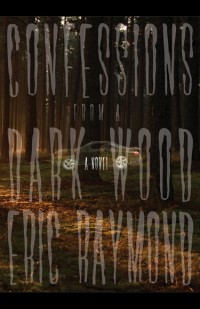 Confessions from a Dark Wood
Confessions from a Dark Wood
by Eric Raymond
Sator Press, 2012
204 pages / $13.00 buy from Sator Press
1. The book begins with a section of “Advance Praise.” Among the quoted, all characters from the story about to unfold, is the deceased father of the author (or co-author, we are told), who gives what is perhaps the first indication that the world you have entered is not only darkly satirical, but propelled forward by something urgent and deeply felt. We may not yet recognize this as the complicated love between father and son, but we catch a glimpse of it and it startles:
“Oh, so you finally have a book. You must be so proud. Congratulations, son. You know, in the afterlife, books are our toilet paper. I’m saying we literally wipe our asses with books. Go figure.”
2. There is little sentimentality here. We meet Nick Bray at his father’s memorial service, which he likens to a church tag sale. He describes what has been left out of the haphazard displays of the artifacts of his father’s life. An empty table, he tells us, “might have stood for all that was omitted from a memorial, i.e. a few decades of filching undergraduate panties, a pyramid of Miller Lite cans, a tape loop of doors slamming around our house, and the amputated legs below the knee, which had shuffled off this mortal coil six years ahead of my father.”
3. At this memorial, a stranger approaches Nick with a potentially lucrative, albeit mysterious job offer, which he dismisses.
4. Back home, after he is fired from his job at an internet porn company where he writes promotional copy, he is forced to assess his situation. He is aimless. He dresses poorly (consider the white Cuban shirt and slip-on shoes he wears to the funeral). He is broke. He reconsiders.
5. One of Nick’s new coworkers is an orangutan. I am not speaking in metaphor. “Shelby” is an advisor to Pontius J. LaBar, CEO, LaBar Partners Limited. He has his own office, of course.
6. Full disclosure: I consider Eric Raymond a friend and fellow traveler although we know each other almost exclusively through twitter. I had coffee with him once at Four Barrel on Valencia. There was a taxidermied moose head that was later stolen. It was nice: the coffee, the moose head. In this book, there is an unflattering portrayal of a Korean adoptee. I am trying not to hold it against him.
7. I am a Korean adoptee.
8. Friend or no, unflattering representations or no, it is difficult not to be drawn into this bizarre world, to be seduced, as Nick himself is, into a surreal landscape of glittering surfaces.
9. After the limousine rides and the custom-made suits; after the commissioned “superfixie,” the apartment overlooking the city, the DuMol Viogner, Nick is well on his way to his new life of airports and minibars in highrise hotels. Expect jargon-laden client meetings and self-annointed brand experts. Expect furious email messages at all hours of the night from the buffoon Pontius. Paranoia. Buffoonery.
10. What do you do when you open the door to the airplane lavatory only to find your dead father waiting for you? If you are Nick Bray, you ask him for advice and then watch as he flushes himself down the toilet. READ MORE >
November 28th, 2012 / 1:01 pm
25 Points: Strange Cowboy
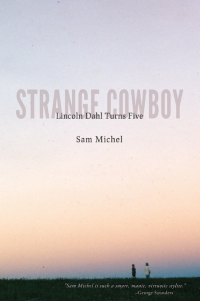 Strange Cowboy: Lincoln Dahl Turns Five
Strange Cowboy: Lincoln Dahl Turns Five
by Sam Michel
Tyrant Books, 2012
200 pages / $14.95 buy from Tyrant, SPD, Amazon
1. I don’t remember my fifth birthday.
2. Lincoln Dahl, though, remembers his.
3. Lincoln Dahl is the narrator of Sam Michel’s novel, Strange Cowboy, subtitled Lincoln Dahl Turns Five. I suppose the subtitle might make the first phrase of this point redundant—so let me add that there are two Lincoln Dahl’s, the father, our hero, and his son, whose birthday it is.
4. The novel takes place on the day of the party for the younger Lincoln’s fifth birthday. But the actual events of the day serve only as a kind of grounding for the elder Lincoln’s mess of memories.
5. If this book were attempted by a writer any less capable than Sam Michel, it might very well be awful.
6. I’m a sucker for books that play with memory. Especially childhood memories. I like that they’re complicated mysteries. I like that they’re relatable. Everyone has a childhood littered with blocks for good language to rearrange and play with.
7. With so much of memory, we have to take our parents’ word for it. Especially birthdays One through Five. The Fifth is really the first we might be able to remember. The Fifth birthday is a kind of second birth, one of memory. Maybe it’s the line between child and kid.
8. Now the younger Lincoln is five, and he’s going to remember his father. The elder Lincoln knows it from experience.
9. On being a good father:
I hear my wife inform me that my duty to the boy, in part, is to provide for him a model…As it stands, my son’s past with me has been a woozy spiral of neglect and woundings. Lucky for us—for me, she meant—he isn’t likely to remember. Till now.
10. On making it up to him:
“’He’s at the age where he remembers,’ said my wife. ‘Give the boy a party. Anything is possible. I bet he’ll forget you were the one who burned his drawings.’” READ MORE >
November 27th, 2012 / 12:09 pm
Mira Gonzalez has a book coming out
Mira Gonzalez‘s first book, i will never be beautiful enough to make us beautiful together, is now available for pre-order from Sorry House, a new press founded by Spencer Madsen. It will be published in January. The trailer above is by Meggie Green and Michael Inscoe.
It’s a book of poems. I’ve read the manuscript and enjoyed it. The poems are declarative, metaphorical, full of imagination and dreams as well as physical events. They create a feeling of rudderlessness, an uncanny mixture of confusion, sadness, and detached introspection.
Click here to read a poem by her on her tumblr and see one of her collages, which I also like. Also there’s these poems and this one.
As an added bonus, Mira is a real fun, nice person to interact with, and her Twitter is very enjoyable and funny and zany.
Sorry House has rounded up an impressive group of blurbs from Blake Butler, Melissa Broder, Brad Listi, Tao Lin, and Victor “Kool A.D.” Vazquez.
I feel nice that Mira will have a book out in January and I’m glad Spencer is making a press according to his particular tastes and collaborating with lots of good people.
25 Points: Waiting Up for the End of the World
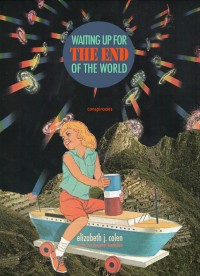 Waiting Up for the End of the World
Waiting Up for the End of the World
by Elizabeth J. Colen
Illustrated by Guy Benjamin Brookshire
Jaded Ibis Press, 2012
142 pages / $32.00 (color), $16.99 (BW) buy from Jaded Ibis Press
1. Conspiracy theories are enjoyable, people who embrace conspiracy theories can be depressing but when you’re not listening to one and simply letting your thoughts amble along wondering about JFK or the Lunar Landing or 9/11 you can entertain yourself for hours without getting far away from yourself—at least not too far to recognize who the hell you are when you’ve finished. It’s exactly the same principle that draws an H.P. Lovecraft to writing about fictive beasts and Tolkien to create an entirely different world to tolerate living in this one: embellishment, lies, theorizing, half-truths, all of these things provide immediate freshness to a very stagnant daily existence, and we as people cling to these in some form or another with some consistency at for at least part of our lives.
2. Sometimes conspiracy theorists creep me out; sometimes they don’t. This time, they don’t.
3. Books of poetry written on a theme, much like concept albums, are more direly hit-or-miss than mere collections of one’s best work. To let oneself think for a long time about one story and let it someday become a novel is—compared to this—a relatively easy feat, but to somehow tie together large amounts of poetry to coalesce into a book by the finish is nothing less than brilliant.
4. Sometimes themed collections of poetry fail; sometimes they succeed. This one succeeds.
5. Elizabeth J. Colen’s new collection of poetry Waiting up for the end of the World operates from a center of conspiracy—and features the descriptor “Conspiracies,” rather than poems, mind you—and though there’s ceaseless range to the content of each poem and these don’t all merely reflect one central theme per se, there is an anchor throughout of conspiracy and noted theories that’s quite comforting while reading.
6. Is that the mark of a good book of poetry? Comfort? I’m not quite sure but I think of visual artists creating fresh visions of antiquated imagery while tied to comfortable symbols or colors and I’m tempted to argue it’s true. It probably isn’t true, but this book of poetry is oddly comforting for something labeled “conspiracies.”
7. Most of the poems feature subtitles like “Lunar Landing,” “Princess Diana,” “New World Order,” and other household conspiracies that provide the aforementioned comfort, and make Colen’s description of scenes from a character’s youth or a father figure that much more effective and compelling.
8. The idea of the Lunar Landing being faked still terrifies me. These poems sort of mollify that sense of terror through looking more at the guts or emotions of the situation as opposed to the broad spectrum of technical information available (especially with the internet) but still, the idea of the Lunar Landing being faked still terrifies me.
9. Reading this collection during “election day” hoopla is ideal, but reading it in one month you’ll have another set of lunatics screaming at you and a year from now the same goes so I wouldn’t worry about it, I’d probably just buy the book.
10. Elections make Americans politically paranoid for roughly four months on either side of election day and then for a very long time we work and do a bunch of other more important shit that has nothing to do with politics. READ MORE >
November 21st, 2012 / 1:09 pm
ON THE LITERARY DETERRITORIALIZATION OF THE OCCULT
MAGICK IS SUCH my jam it’s the best. To intervene, to sculpt the forces in motion that lie ever behind all phenomena – I really don’t know how to work any other way. Even tho I suck at math, I’m pretty boss at jimmying an algorithm, noticing how the hidden variables shift and float. Numbers are less important than access to archetypes, gods as guides dropping this or that for us to notice, signposts and gestures, fleeting affinities that when frozen stand as nexus-objects multi-dimensional we can intuit beyond boundary. With the Will, that’s us – burning variable altering environment by manipulating the living furniture in the hidden room behind.
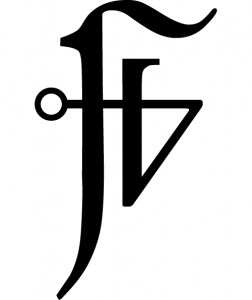 The letter word the sign is never not a sigil. Given, there are greater and lesser degrees of involvement. Sometimes the immobility of the intent is monolithic and plinth-like, entirely discernible, or else it’s more about the splitting/rejoining of a designated grammar, terms or characters as place-holders for the energies contained therein, their recombinant effect resulting in whatever transcendent endgame is necessary to render organs null and of a single glowing body.
The letter word the sign is never not a sigil. Given, there are greater and lesser degrees of involvement. Sometimes the immobility of the intent is monolithic and plinth-like, entirely discernible, or else it’s more about the splitting/rejoining of a designated grammar, terms or characters as place-holders for the energies contained therein, their recombinant effect resulting in whatever transcendent endgame is necessary to render organs null and of a single glowing body.
Expression bunches and twists the only fabric, tears through veils, the silence, so that we might recalibrate, effect a given change, order what we know as Chaos and the rest of it.
One thing I’ve noticed is that literary writing by self-identifying occultists is often quite bad, even as (or because) it demonstrates its principles. On the other hand, literary writers who’re interested in the dynamics of occult philosophy and practice have generally produced exciting work.
The best example, my go-to guy, is Henri Michaux. More adept at watching his own imagination than any other artist I can think of, he explored inner worlds, wrote exorcisms, and all the time revealed his process. The most memorable piece in this vein is a malediction called “I AM ROWING”: READ MORE >
25 Points: Wonderbender
 Wonderbender
Wonderbender
by Diane Wald
1913 Press, 2011
84 pages / $11.00 buy from 1913 Press
1. My friend, N, told me about this book. Sometimes I feel like I don’t know who is living out there. It’s a crushing thing that hovers around me. I want more voices to hunt me. N and I trade pictures of wonder using smart phones. I felt very demanding when I put my request for this book into the Inter Library Loan’s mouth.
2. A t-shirt that said, “Wonderbender” is a t-shirt that I would wear everyday. It would be my fun coat. A wonderbender is what I nods towards everyday. This is a title that jumps out of a cake with Diane Wald’s gray cat in its arms.
3. “odd how you wait for me to speak/odd how i do it.” My friend, J, told me about a letter that has no sound to it. It is a guttural letter. It is pregnant breath. (The mom)ent before and possibility with its posse raging. Lip blubber flying everywhere. Wide load signs. In all shapes the I wonders to all shapes of wonder. Why do this? Why not do it in heaves? Why not bring in overwhelming hauls?
4. Wild gestures. Something beyond facial expressions is what that voice is making you feel uncomfortable at. “when my poetical delineator is out of order…amen.” Michael Taussig parades a thing I am in love with in The Magic of the State. “And because I feel that I am more known by this than knowing…” I think Wonderbender nods along.
5. “First, that is not the name of the bird. The name of the bird is Jen.” I want to name the cat Doug. The other cat will be Linda. Names don’t automatically build a person on a page or build a page a person. Names might just be an empty house flapping curtain teeth. A brush with a body, with a ghostly glow. I read a poem that threw a Jen in at the last minute. The I of the poem called Jen about hearing God farts. Most of the readers I read that poem with had questions about the kind of milkshakes Jen likes, why she was drinking them there, what she might slurp next. I thought about this for days after. Can’t Jen just be hitching a ride in back of the poem? Can’t she just shake there?
6. “It’s got more turquoise in it than that and even/ turquoise / is wrong by a long shot.” Our best avocado say you can be all the bad cover band you want.
7. “You scream. Literally you say hello politely, but I know you scream.” What a good bike ride through a horror movie this line is. Below us, the neighbors do not like us. They say we are loud, screaming with the help of our furniture. We slip a note under the door that says, “We’re sorry. We’re just talking. We’re just waking up. We’re just writing.”
8. “please do not hurt me oh i am absurd.”
9. When is this not a package deal? When is there not a nest at the bottom with cut out broncos in it and film negatives and a scrap of important color leaking? When am I not packaging? When are the women not walking along a slow part of the desert, looking for little bones? “i think i will send you a package.” Something big and spilling.
10. “or i have little information” READ MORE >
November 15th, 2012 / 10:53 am
25 Points: The Body is a Little Gilded Cage: A Story in Letters and Fragments
 The Body is a Little Gilded Cage: A Story in Letters and Fragments
The Body is a Little Gilded Cage: A Story in Letters and Fragments
by Kristina Marie Darling
Gold Wake Press, 2012
56 pages / $12.95 buy from Amazon
November 13th, 2012 / 9:09 am

